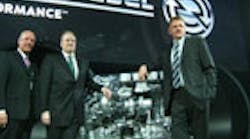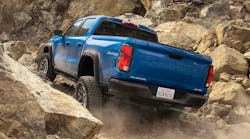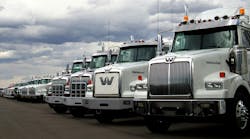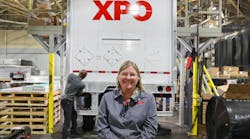Detroit Diesel Corp. (DDC) is rolling out a new engine line that will form a global platform for engines built for commercial trucks in Asia, Europe, and North America. The first model, the14.8-liter DD15, is due to be introduced into the U.S. market in March 2008.
“This is the first application of our global heavy duty engine platform that will power our commercial trucks worldwide,” said Andreas Renschler, head of Daimler Trucks, DDC’s parent company, during a press conference in Redford, MI. “These new engines will first be introduced into our Freightliner, Western Star, and Sterling brands, followed by Mercedes Benz and Mitsubishi Fuso trucks in Europe and Asia.”
Germany’s Daimler AG spent $1.5 billion to develop this new global platform of engines, added Renschler, with $275 million dedicated to upgrading DDC’s engine manufacturing plant in Redford, MI.
Michael Dostal, head of powertrain operations and manufacturing engineering for Daimler Trucks, noted that “regional versions” of the engine platform will be developed for Europe, Asia, and North America to match their respective emission and operating requirements. Thus, 90% of the engine will be the same across the world, with specific regional components comprising just 10%.
Chris Patterson, president and CEO of Freightliner LLC (which changes its name to Daimler Trucks North America next year), added that the new DD15 and subsequent models were designed from the ground up to deal not only with current emission regulations, but also those waiting in the wings for 2010 and beyond. The new platform will fully replace DDC’s current Series 60 engine line by 2010.
“Historically, trucks owners had to manage tradeoffs with their engines,” he explained. “You had to choose between performance or fuel economy, drivability vs. durability, long service intervals vs. inexpensive maintenance. Now we think we have an engine that truly has it all, with no tradeoffs anymore.”
According to Jim Gray, program director for the DD15, production of the new engine is slated to begin in March 2008 with a base model 450-hp. DD15 producing 1,550 to 1,650 ft.-lb. of torque aimed at the fleet market, followed by a 560-hp. version producing 1,750 to 1,850 ft.-lb. of torque, primarily for owner-operators
Compared to the Series 60 it replaces, the DD15 offers 75% better torque response, is 31% quieter, and improves fuel economy by 2% to 5%. Operators will be able to maintain peak torque between 800 and 900 rpms, compared to the 1,100- to 1,300-rpm peak torque range of the Series 60, he added.
David Siler, DDC’s director of marketing, noted that “turbo compounding” is one of the key ways the company improved the DD15’s fuel economy footprint. By re-directing waste heat from the engine’s twin turbochargers -- heat that in the past was lost to the exhaust system- –to a small turbine wheel within the engine, the DD15 gains an additional 50 hp. and 192 ft.-lb. of torque. “This is energy that would have simply gone out the tailpipe,” he said.
Siler added that DD15 comes equipped with an integrated engine brake, and that service intervals are 50,000 miles for changing the oil, fuel filter and oil filter. Overhead valve lash adjustment is required at 60,000 miles. He noted that DDC has accumulated 3.5 million worth of test miles on the DD15 to date, and expects to reach a total of 4 million to 4.1 million by the time the engine is launched next year.
Tim Tindall, DDC’s director of emission programs, said up to four models from the company’s new engine line are coming to the U.S. market: the DD15 in March 2008, followed by the 12.8-liter DD13 in January 2009 and the 15.6-liter DD16 in the first quarter of 2010. Right now, the company is still deciding whether to bring its 10.6-liter DD11 to the U.S. market. “That’s because at 10.6-liters is where you start thinking about switching down to a medium-duty truck engine,” Tindall told Fleet Owner.
. “We began this new ‘clean sheet of paper’ design effort back in 2001 because it was apparent that our current engines could not meet the emissions rules of the future,” explained Gray. “Not only do we now have a platform that will help us focus on emission requirements now and for the next 15 years, we’ve also reduced complexity by consolidating our engines into one family.”




